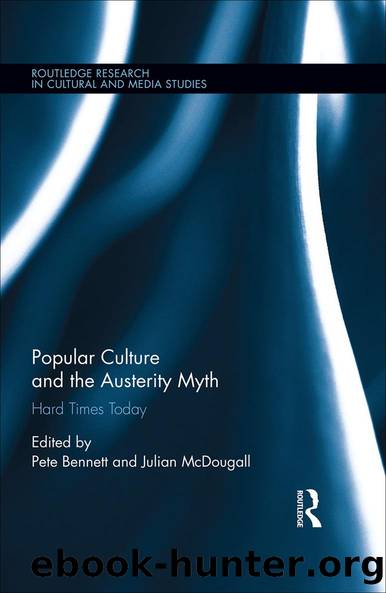Popular Culture and the Austerity Myth by Pete Bennett Julian McDougall

Author:Pete Bennett, Julian McDougall [Pete Bennett, Julian McDougall]
Language: eng
Format: epub
ISBN: 9780367874384
Barnesnoble:
Publisher: Taylor & Francis
Published: 2019-12-10T00:00:00+00:00
Naked Ideology?
Owen Jones, striking a very similar chord to one of our respondents, asks âhow has hatred of working class people become so socially acceptable?â (2012, 2) and presents an account for the deliberate obscuration of the structural causes of the social problems the popular media audience so love to be appalled by, combined in the demon figure of the âChavâ. In the UK, we must be clear that the New Labour Government of Tony Blair set this in motion with its discursive marker of âsocial exclusionâ, inherited by David Cameron and newly presented as âBroken Britainâ, with both administrations presenting âThe Stateâ as the problem and reform as the solution.
While Benefits Street has been shown by this research to be unpalatable for left-leaning liberal viewers, its conventions are in keeping with some key Žižekian observations about the failure of the left to respond adequately to the workings of ideology in the contemporary popular media. Žižekâs bluntest and perhaps simplest critique is that ideology in our ânew hard timesâ leads us to uphold values and institutional practices while not agreeing with them â not false consciousness but knowingly cynical material action (or the lack of). With this text, it is in the nature of the revelation that we can see the inner workings of the neo (post?) â liberal ideology. What is revealed in this latest manifestation of the âdemotic turnâ (Turner 2010) is the fetishized manifestation of âthe otherâ in personal and domestic behavior. The context of austerity is apparently neutral. There is no unmasking, the ideology presented merely as a distorted âcommon senseâ to be unveiled as false, but instead as viscerally, aggressively and nakedly ideological â but in such a way as to be structurally inescapable in practice â this is Žižekâs âefficiencyâ of ideology â our (liberal) opposition to it is reduced merely to âcynical distanceâ which makes no difference to it. Meanwhile, it gathers ever more momentum through itâs appeal, while clearly illusory, to address ârealâ human beings with ârealâ anxieties. This is most strikingly played here out in the film-makersâ reactions; while the issues are seemingly closer to home than for our other participants, the common sense polarity between apparently wilful domestic, social and economic practices is far more entrenched. Another victory of epistemic violence upon todayâs âunworthy poorâ, no longer deserving of welfare but collateral damage in an ideological war on âstatismâ. This war is played out in a popular media which, perhaps, ironically puts more âordinary peopleâ on screen than ever before, now as objects of derision in the cultural space that used to give them voice.
Download
This site does not store any files on its server. We only index and link to content provided by other sites. Please contact the content providers to delete copyright contents if any and email us, we'll remove relevant links or contents immediately.
Phoenicians among Others: Why Migrants Mattered in the Ancient Mediterranean by Denise Demetriou(606)
american english file 1 student book 3rd edition by Unknown(605)
Verus Israel: Study of the Relations Between Christians and Jews in the Roman Empire, AD 135-425 by Marcel Simon(590)
Caesar Rules: The Emperor in the Changing Roman World (c. 50 BC â AD 565) by Olivier Hekster(571)
Basic japanese A grammar and workbook by Unknown(571)
Europe, Strategy and Armed Forces by Sven Biscop Jo Coelmont(520)
Give Me Liberty, Seventh Edition by Foner Eric & DuVal Kathleen & McGirr Lisa(497)
Banned in the U.S.A. : A Reference Guide to Book Censorship in Schools and Public Libraries by Herbert N. Foerstel(488)
The Roman World 44 BC-AD 180 by Martin Goodman(478)
Reading Colonial Japan by Mason Michele;Lee Helen;(467)
DS001-THE MAN OF BRONZE by J.R.A(462)
Introducing Christian Ethics by Samuel Wells and Ben Quash with Rebekah Eklund(455)
Imperial Rome AD 193 - 284 by Ando Clifford(454)
The Oxford History of World War II by Richard Overy(453)
The Dangerous Life and Ideas of Diogenes the Cynic by Jean-Manuel Roubineau(451)
Catiline by Henrik Ibsen--Delphi Classics (Illustrated) by Henrik Ibsen(426)
Language Hacking Mandarin by Benny Lewis & Dr. Licheng Gu(409)
Literary Mathematics by Michael Gavin;(407)
Brand by Henrik Ibsen--Delphi Classics (Illustrated) by Henrik Ibsen(389)
